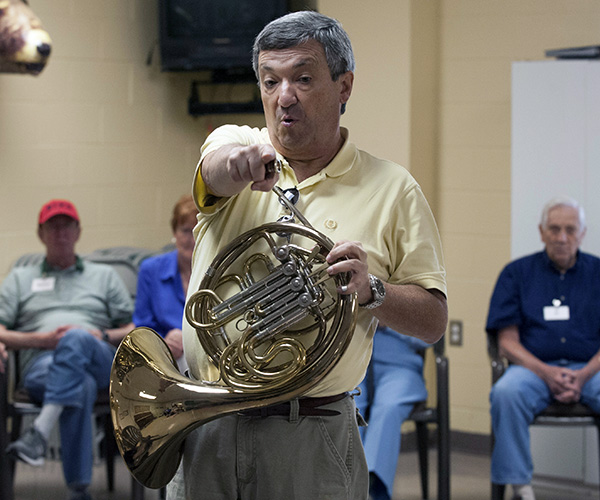
Mike McClary presents a French horn demonstration. (photo by Bill Roa)
Mike McClary delights Grace Arbor participants with his humorous musical presentations.
GPC professor brings music, laughter to adult day care
Bill Williams may have issues with his memory, but he definitely recalls how to move to the music. “Dancing is my favorite activity,” says Williams, who attends Grace Arbor, an adult day care center for men and women with early-stage dementia.
Dancing was just what Williams was doing on a recent summer day at Grace Arbor, when special guest Mike McClary, a Georgia Perimeter College music professor, demonstrated several musical instruments.
McClary says he volunteers at Grace Arbor to honor his late father, who suffered from Alzheimer’s. He has been entertaining the group for years and also volunteers at other similar facilities in the metro area.
“I had never seen an Alzheimer’s patient up close until I saw my dad decrease in his life forces,” says McClary. “Volunteering at Grace Arbor was just something automatic. It was as though [Grace Arbor founder] Robin and I were directed together. She called and said ‘will you come?’ and I said ‘you bet—how much and how often?’”
Grace Arbor operates four days a week and currently serves 28 men and women. It is a respite ministry of the United Methodist Church in Lawrenceville. Founded by Robin Dill nine years ago, the program offers faith-based activities, music, art, games, dance and relaxed mealtimes in a joyous atmosphere.
McClary entertained the group with his French horn, slide trombone and brass tuba. Here are some of the fun facts he shared:
-- The French horn, also called the double horn, is 12 feet, 9 inches long when unwrapped.
-- The French horn doesn’t come from France but rather from Germany.
-- The slide trombone was originally called the sackbut or push-pull. The instrument has no position markings telling the player where to place the slide, so trombonists must learn by demonstration, repetition and evaluation by their teachers.
-- The brass tuba weighs more than 65 pounds. Tubas also can be made of fiberglass or plastic, making them much lighter, but that diminishes the quality of the sound.
